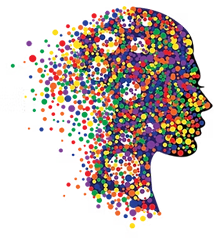Autism
Therapy for Adults

It’s not uncommon to associate autism with children, but the truth is that many individuals aren’t diagnosed until they are well into adulthood. Our autism therapy for adults aims to unlock strengths, combat difficulties, and navigate your social and professional life with confidence. Living with autism as an adult can present a plethora of challenges, and we are here to provide the support to help you lead a fulfilling life and achieve your goals.
The Signs of Autism
Autism, or ASD, is not always a straightforward condition. Every person experiences it differently, so it is crucial to receive tailored support. To determine the best type of therapy for adults with autism, it is necessary to undergo a comprehensive assessment. Many adults go for years with undiagnosed autism, developing unique coping mechanisms that mask their challenges. However, this is only a short-term solution. If you are experiencing any of the following difficulties in life, it is definitely worth talking to a professional to overcome them:
- Difficulty understanding social cues. This might include facial expressions, voice tones, or body language.
- A need for routine and distress if it is ever disrupted.
- Intensified focus on specific hobbies and topics.
- Sensory sensitivity, such as feeling overwhelmed by loud noises or multiple conversations in public spaces, bright lights, or not being able to tolerate certain textures.
- Difficulty maintaining or forming relationships.
- An inability to think flexibly or adapt to changes.
Understanding the signs of autism is the first step towards receiving the right therapy for autistic adults.
Social Communication and Interaction Difficulties for Adults with Autism
Most adults on the autism spectrum find that their primary challenges lie in social communication and interaction. For some, everyday conversations can be too difficult, especially when societal norms don’t make sense. This can lead to feelings of anxiety and isolation, which can have a significant impact on both personal and professional relationships.
An autism therapist can help if you struggle with small talk or reading subtle social and emotional cues. They can help you understand figurative language, adapt to group interactions, and help you feel less socially drained. Therapy for adults with autism can allow you to develop fundamental strategies to build positive, long-lasting relationships with friends, family, and colleagues.
Neurotherapy Clinics Australia
Behavioural Patterns that Might Require Autism Therapy
As well as social challenges, many adults with autism display specific behavioural patterns. While some may be linked to creativity or attention to detail, others have a tendency to interfere with daily life. For instance, you may have developed repetitive behaviours, such as repeating phrases, rocking, or hand flapping, maintain rigid routines, or find that you’re over- or under-sensitive. Additionally, if your interests dominate your time, overshadowing your responsibilities, there is a chance you might experience benefits from our autism therapy.
The Autism Spectrum
Therapy for autism in adults is not a one-size-fits-all process. ASD is best understood as a spectrum that reflects a vast range of experiences and abilities. Some adults with autism may live entirely independently and thrive in their social and professional lives. However, others may require regular or even daily support. While modern diagnostic frameworks of autism group everything together underneath one spectrum, it is still helpful to have an understanding and appreciation of the diversity of experiences adults with autism deal with. The most recognised conditions within this spectrum are Asperger’s Syndrome, Rett Syndrome, and Pervasive Developmental Disorder, each one encompassing several different challenges.
Asperger’s Syndrome – This describes those who tend to demonstrate above-average intelligence and strong verbal skills. However, individuals with Asperger’s Syndrome often struggle with social interactions and hyper-focused interests. Autism therapy for adults with Asperger’s focuses primarily on social skills training, emotional regulation, and support with managing stressors that many encounter throughout their daily lives.
Rett Syndrome – This is a rare neurodevelopmental condition that primarily affects women and is often associated with cognitive and physical challenges. Symptoms can vary widely, but can include motor difficulties, communication impairments, and loss of hand function. While this is distinct from other ASD conditions, our autism therapy for adults can enhance a person’s quality of life through tailored communication support, sensory regulation strategies, and occupational therapy.
Pervasive Developmental Disorder – This area of the spectrum was initially used to describe people who displayed some but not all characteristics of autism. Today, it is often referred to as the broader autism spectrum diagnosis. Adults with PDD usually experience mild difficulties in social interactions, adaptability, and communication. Our autism therapy aims to support independence and develop better coping mechanisms for these everyday challenges.
Our Neuroscientific Approach to Autism in Adults
While traditional approaches to therapy for autistic adults focus on behavioural management, we aim to address the neurobiological underpinnings of each client’s specific challenges. Our neuroscientific approach combines state-of-the-art brain mapping with real-world interventions and practical coaching.
Neurotherapy Clinics Australia
QEEG Brain Mapping for Adults with Autism
Quantitative Electroencephalography (QEEG) mapping is a non-invasive technique that provides a detailed picture of your unique brainwaves. This means we can identify the regions of your brain that are under- or overresponsive, as well as underconnectivity between areas that are responsible for social processing. By identifying these areas, our autism therapist can develop a fully personalised plan that aligns with your precise challenges.
The Rest
Our autism therapy for adults also involves relaxation and self-regulating techniques that reduce the stress that can be caused by sensory sensitivity and social demands. We also use guided imagery to reduce anxiety and help you develop strategies to remain calm. Throughout your autism therapy, you’ll also receive in-depth social and cognitive coaching tailored to your specific everyday life. This ranges from communication strategies to developing the skills to thrive in a workplace environment. Our aim is to help you develop new social skills in real-world contexts that relate to you, enabling you to live a more confident and independent life.
